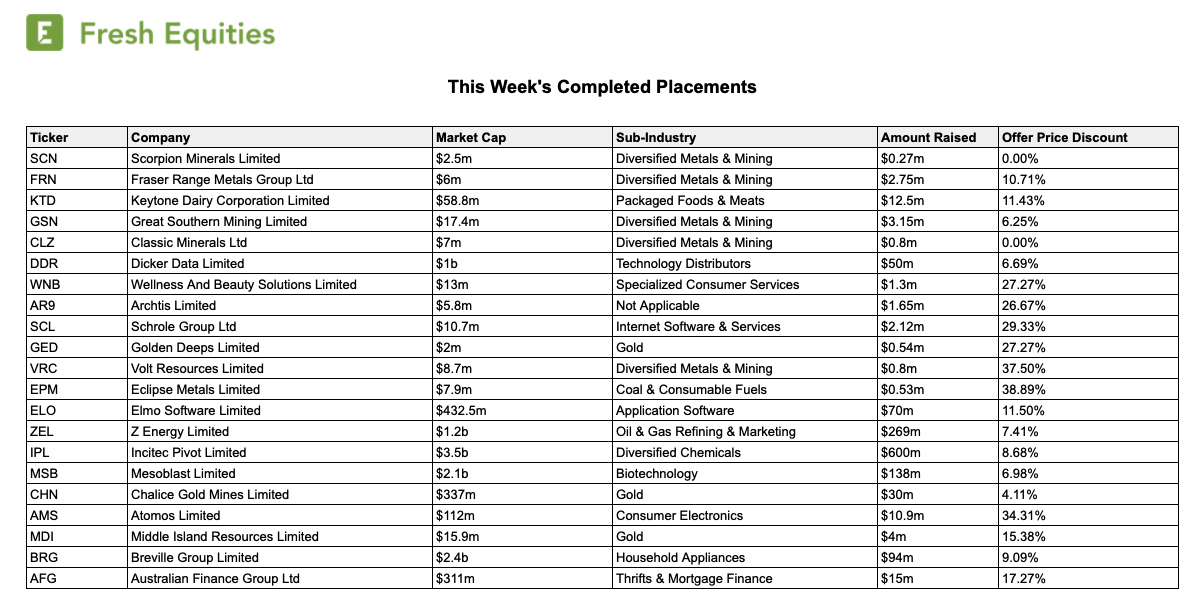COVID-era capital raises are different and $1.5b changed hands: This week in capital markets
There were plenty of quick raises
Biotech plays take time to actualise, Mesoblast is a prime example. It was only last October that they came to the market asking for funds and were back this week raising $100m via a fully underwritten placement. The company was pitching the use of one of its stem cell products to assist with the treatment of coronavirus. When the deal launched officially it carried a disclaimer that the book was already "covered" which didn't leave much of a look in for those outside the inner circle...
There was also a first timer in market this week. Small appliance maker Breville raised fresh funds for the first time ever. In what we understand to be roughly a 2 hour window, Breville raised $94m to shore up their balance sheet and continue with growth plans. Not bad for a retail business in this climate.
The mantle for the week's biggest raise went to Incitec Pivot who went looking for $600m in order to pay down debt. It was another quick raise, the book was declared covered by lunchtime, less than 4 hours after the "official" launch. Existing shareholders were looked after. According to the completion announcement 98% of the placement went to existing shareholders on a (mostly) pro-rata basis. For those that missed out, a $75m SPP followed at the lesser of the placement price or a 2% discount to VWAP before close. With this raise at least, it appears that the ASX/ASIC's crackdown on allocations has started to resonate.
Speaking of new rules...
Companies raising capital have been embracing ASX relief measures
- Temporary extra placement capacity which allows companies to raise up to 25% of shares on issue (up from 15%), provided that the placement is accompanied by an Entitlement offer or SPP.
- A removal of the cap on non-renounceable offers that = allows companies to complete an offer above a 1:1 basis. E.g. a company could now conduct a 2:1 entitlement offer (meaning two new shares will be issued for every existing share).
- Allow for back-to-back trading halts so that companies now have up to 4 trading days to complete a capital raise."
So, how has the market responded?
The placement + SPP combo has become the new norm. In times like these capital is needed quickly and from steady hands, this is much easier to achieve through a placement + SPP vs. an entitlement offer. Placements are quick and targeted - as we've seen this week they can be filled in less than a day, and the company has the ability to choose where money goes. Doing a raise this way also mitigates market risk by limiting the exposure to retail investors whose risk appetite has generally been lower since COVID. Of course there is also benefit for investment banks, who can offload their underwriting commitment in a shorter period.
We are seeing many companies heavily favour existing institutional shareholders in their placements, offering quasi "pro-rata" allocations (much like they would have received in an entitlement offer). The follow-on SPP is then meant to provide an opportunity for all other shareholders to participate up to $30,000.
So far only a few companies have opted for a highly dilutive entitlement offer on a greater than 1:1 basis. Small caps are the obvious candidate for this sort of raise and given the impact this sort of capital event has on existing shareholders we suspect many will be waiting for better conditions/news. We count 5 of these offers live at the moment, not all of them successfully completed, but more likely on the way.
There's been 130 placements conducted since COVID hit and the rules went live - some raises have gone well, some haven't - let us know in the comments what you think of capital raising during the COVID era.

2 topics
21 stocks mentioned